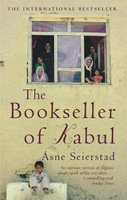 Title: The Bookseller of Kabul
Title: The Bookseller of Kabul
Author: Åsne Seierstad
Translated by: Ingrid Christophersen
ISBN # 1844080471
Publisher: Virago
First Published: 2002
276 pages
Format: Paperback
Rating: 7/10 Synopsis:
Two weeks after September 11th, award-winning journalist Åsne Seierstad went to Afghanistan to report on the conflict. In the following spring she returned to live with a bookseller and his family for several months. The Bookseller of Kabul is the fascinating account of her time spent living with the family of thirteen in their four-roomed home. Bookseller Sultan Khan defied the authorities for twenty years to supply books to the people of Kabul. He was arrested, interrogated and imprisoned by the communists and watched illiterate Taliban soldiers burn piles of his books in the street. He even resorted to hiding most of his stock in attics all over Kabul. But while Khan is passionate in his love of books and hatred of censorship, he is also a committed Muslim with strict views on family life. As an outsider, Seierstad is able to move between the private world of the women - including Khan's two wives - and the more public lives of the men. The result is an intimate and fascinating portrait of a family which also offers a unique perspective on a troubled country.
Review:
I'm not sure what I was expecting, but this was a complete surprise even from just a few chapters in. The double standards are despicable - if an adulterous couple is caught and only one punished (for whatever reason), it is the woman more often than not, and the punishment is most often death; girls are not allowed to smile at or talk to boys, not even to look at them, never mind be alone with them, for fear of them being "spoiled goods" and being beaten to within an inch of their lives; having to be covered from head to foot in all but the most permissive of households - even though I knew all this before I started reading, I found it completely shocking. Another aspect, with which I had trouble dealing, is a society where books, art & priceless historical artifacts of the Afghan heritage were willfully destroyed because of religious beliefs - it's utterly tragic.
The rituals observed, both in daily life and on special occasions, are absolutely fascinating, as is the fact that any woman would actively choose to wear a burkah over "normal" clothing that would be cooler to wear and allow more freedom of movement. The fact that while wearing this item, the women are actually described as burkahs, rather than called by name, adds to the anonymity it provides. Even though Afghan women lead far more sheltered lives, they have the same hopes and desires are any other women around the world - it's heartbreaking that they would be so harshly punished for acting on them. The family dynamics and the hierarchies, both within the family and the society, are very interesting.
Bookseller isn't really a very flattering book, neither of Sultan's family or his countrymen. Then again, with Afghan cultural attitudes the way they are, I think it would have been very difficult to portray them any more sympathetically than was done (although Sultan is arguably more progressive than many other men in that society). I found myself both pitying & disliking some of the family members (such as Mansul - he wants to do his own thing, but he's incredibly lazy with it) & reading about how the women are treated over there was incredibly uncomfortable & made me feel very lucky to live where I do!
There's a quote that particularly stood out for me:
Sultan said, “If the families don't have rules, how can we form a society that respects rules and laws, and not just guns and rockets? This is a society in chaos; it is a lawless society, right out of a civil war. If the families are not guided by authority, we can expect an even worse chaos to follow. “
Although I am still appalled at the way Sultan treats his family - like a tyrant, rather than a father, brother or son - I can't help feeling there is a grain of truth in what he says here. Children today seem to act in ways I would never have dreamed of acting when I was a child, with a complete lack of respect for others, especially those in positions of authority. Many are simply not taught that there are boundaries that should not be breached and that there is behaviour that is unacceptable in society. However, I think that cultures such as the one portrayed in this book have gone too far the other way, allowing no freedom at all & giving punishment that far outstrips many of the perceived. I'm not sure this teaches respect, more that it teaches fear & engenders an air of simmering resentment that will be taken out on future generations - an ever-perpetuating circle.
This is one of those books that will stay with you long after you’ve read it, and one that will undoubtedly fuel discussion, and therefore an excellent choice for a book group or reading circle.
 Title: The Bookseller of
Title: The Bookseller of 

0 Comments:
Post a Comment
<< Home